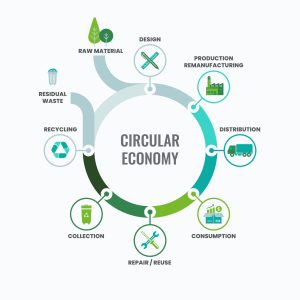EPR for E-Waste management in India
Extended Producer Responsibility (EPR) is a step towards enabling circularity by obligating Producers to practice / enable repair & refurb of their products thereby enhancing sustainability. In November 2022, the Ministry of Environment, Forest and Climate Change (MoEFCC) introduced the E-Waste (Management) Rules, 2022 laying down the guiding principles for EPR & Recycling, under the regulation and governance of the Central Pollution Control Board (CPCB) and State Pollution Control Boards (SPCB). These rules are a significant step towards addressing the growing problem of electronic waste (e-waste) in India).
They mandate that all manufacturers, producers, refurbishers, and recyclers register on a designated portal inviting them to be part of “Circular Economy”. This registration ensures accountability and traceability in the management of e-waste.

Key Responsibilities
Registration: Entities involved in the lifecycle of electrical and electronic equipment must register on the portal under the appropriate category—manufacturer, producer, refurbisher, or recycler. This registration helps in creating a comprehensive database of stakeholders involved in e-waste management.
Collection and Recycling: Registered entities are responsible for collecting e-waste generated during the manufacturing, refurbishing, or disposal of their products. They must ensure that this waste is properly recycled or disposed of in an environmentally sound manner. This includes setting up collection centers and collaborating with authorized recyclers.
Reporting Obligations: All entities covered by these regulations must submit annual and quarterly returns in the prescribed format on the portal. These returns provide detailed information on the quantity of e-waste collected, recycled, and disposed of. The deadline for submission is the end of the month following the respective quarter or year. Non-compliance with these reporting obligations can result in penalties or other legal consequences.
Scope of Regulations
The E-Waste (Management) Rules, 2022 apply to a wide range of entities involved in various stages of the e-waste lifecycle, including:
- Manufacturing: Companies that produce electrical and electronic equipment.
- Sale and Transfer: Entities involved in the sale or transfer of such equipment.
- Purchase: Organizations that purchase electrical and electronic equipment for use.
- Refurbishment: Businesses that refurbish used equipment to extend its lifecycle.
- Dismantling: Facilities that dismantle e-waste to recover valuable components.
- Recycling: Authorized recyclers who process e-waste to extract reusable materials.
- Processing: Entities involved in the final disposal or processing of e-waste.
Benefits of EPR
Environmental Protection: By ensuring proper recycling and disposal of e-waste, the EPR framework helps in reducing the environmental impact of hazardous substances found in electronic products.
Resource Efficiency: Recycling e-waste allows for the recovery of valuable materials such as metals, which can be reused in the production of new products, thereby conserving natural resources.
Economic Opportunities: The e-waste management sector creates job opportunities in collection, recycling, and refurbishment activities, contributing to economic growth.
Consumer Awareness: The regulations also promote consumer awareness about the importance of proper e-waste disposal, encouraging responsible behavior and participation in e-waste management programs.
Challenges and Future Directions
While the E-Waste (Management) Rules, 2022 represent a significant advancement, there are challenges that need to be addressed:
- Infrastructure Development: There is a need for more collection centers and recycling facilities to handle the increasing volume of e-waste.
- Enforcement and Compliance: Ensuring that all stakeholders comply with the regulations requires robust monitoring and enforcement mechanisms.
- Public Awareness: Increasing public awareness about the importance of e-waste management and the role of consumers in the process is crucial for the success of the EPR framework.
In conclusion, the E-Waste (Management) Rules, 2022 are a comprehensive approach to managing e-waste in India. By involving all stakeholders and promoting sustainable practices, these regulations aim to mitigate the environmental impact of e-waste and foster a circular economy.